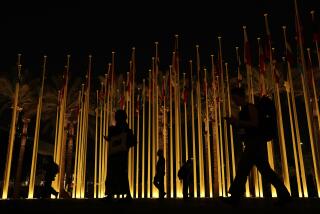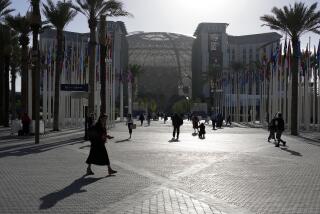Prospects Clouded for Quick Accord on OPEC Strategy : Iran-Iraq War, Saudi Arabiaâs Stance Hamper Efforts by Cartel to Drive Up Oil Prices
GENEVA â The Organization of Petroleum Exporting Countries convened here Thursday amid speculation that it would reach a quick agreement to drive up oil prices, but the Iran-Iraq war and other factors continued to cloud the picture.
Some delegates were privately predicting that a new agreement to reach OPECâs stated goal of pushing up world oil prices to $18 per barrel may be reached in just a few days. One report, which was credited with spurring a run-up Thursday in contract prices for future delivery of oil, had Saudi Arabia willing to compromise on its previously stated refusal to cut production.
But that was discredited later in the day by some delegates here. One of the few clear signals to emerge from the first day of the cartelâs sixth meeting of the year was that Iran wants Iraq to start observing production quotas. Some OPEC observers said that could prove to be a major obstacle to any agreement on raising prices.
Iran Opposes Iraq Exemption
Under the temporary quotas due to expire Dec. 31, Iraq is the only OPEC member exempted from any ceiling on crude-oil production. Iran, desperate for higher prices and gambling that it could slash Iraqi production with military attacks, agreed to that as part of OPECâs move last August to halt the price collapse by reimposing modest production quotas on its members.
Asked Thursday whether Iraq should continue to be exempted from any new production ceilings, Iranian oil minister Gholamreza Aghazadeh said:
âIf we wish to have higher prices, it is the responsibility of all the ministers, all the countries. No one would be excepted.â
Iraq has supported the idea of production cuts, but OPEC analyst Fergus MacLeod noted that that is an easy posture for Iraq to take when it is exempted from such cuts. It remained far from clear Thursday whether Iraq was prepared to agree to quotas itself.
âI think Iran-Iraq could become a major obstacle,â MacLeod said.
Iran is thought to play the dominant role in this latest round of OPEC talks and leads a majority faction that supports production cuts to achieve higher prices. Reuters news agency reported Wednesday that Iran has specifically proposed a 10% cut in production from current levels.
Saudi Strategy Pivotal
Despite the questions raised Thursday about Iraq, the major uncertainty remained the strategy of Saudi Arabia.
Oil ministers from the 13 member nations, including new acting Saudi minister Hisam Nazer, met privately twice during the day at the Inter-Continental Hotel to consider reports from a special pricing committee.
The cartel, in disarray since its own flood-the-market strategy of 1985 sent prices tumbling this year from $30 a barrel to as low as $9.75 in August, is seeking a consensus on how to raise crude-oil prices to an average $18 per 42-gallon barrel.
That would be an increase of $4 to $5 from prevailing prices of OPEC crude. A price of about $18 for OPECâs oil would translate into about $20 for the benchmark U.S. crude, West Texas Intermediate, which lately has commanded about $15 per barrel.
A $1 change in the price of crude oil might eventually change prices at the gasoline pump by 2 cents a gallon.
While there is agreement within OPEC on $18 as an immediate goal, there is disagreement on what OPEC members must do to achieve that price. The Saudis have endorsed a fixed, take-it-or-leave-it price of $18 but said they arenât willing to cut production. Most other OPEC members say that prices canât go up unless production goes down and the world glut of oil is reduced.
A refusal by the Saudis, by far OPECâs biggest producer, to cut production could doom any scheme to raise prices. Nazer politely refused comment on Saudi policy Thursday, as he has since arriving in Geneva two days earlier.
Nazer was named in late October to replace the longtime Saudi oil minister, Sheik Ahmed Zaki Yamani, who was fired by King Fahd in a dispute over oil price policy. As such, Nazer is the focus of much speculation, both in and out of OPEC.
âHeâs probably just taking his time, feeling his way,â said Paul D. Mlotok, oil analyst and vice president at Salomon Bros., who is observing the meeting. âIt seems a reasonable approach. The last thing he needs is to come out with some blockbuster on the first day.â
Some observers have held that the oil ministers will only agree to extend into next year the current production limit of about 17 million barrels per day. The Saudis themselves have actually boosted production in the past few weeks, to well above their quota, understood as a measure to both fill up a new domestic pipeline and to add to Saudi inventories.
More to Read
Sign up for Essential California
The most important California stories and recommendations in your inbox every morning.
You may occasionally receive promotional content from the Los Angeles Times.










